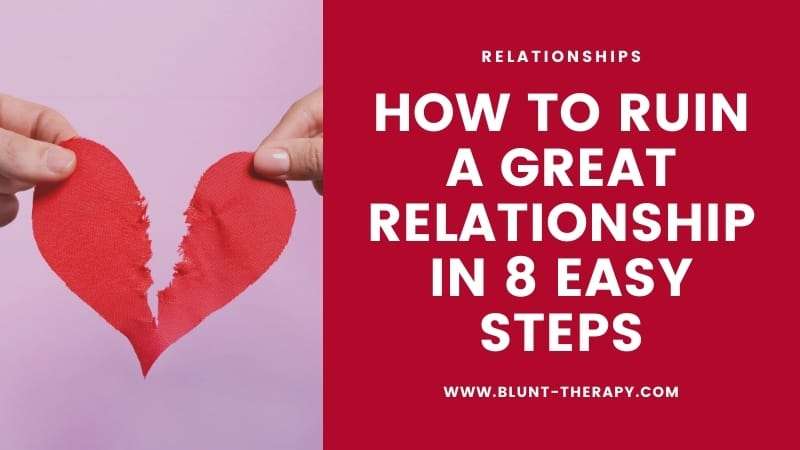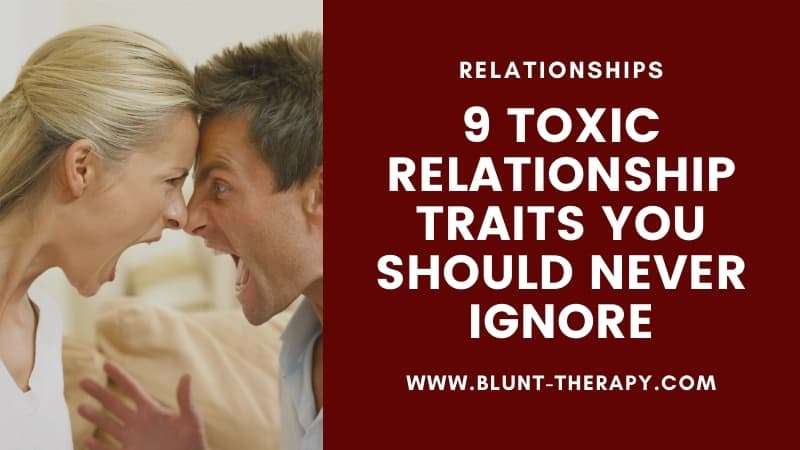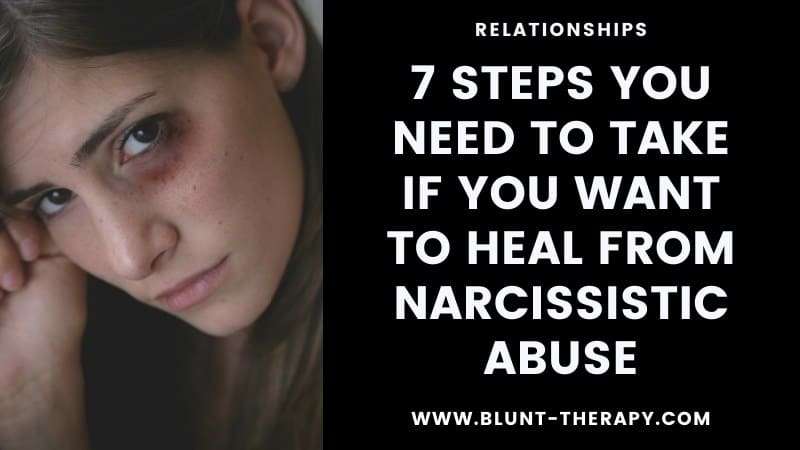Table of Contents
Affiliate link notice: As an affiliate of BetterHelp and other third-party vendors, We will receive compensation if you make a purchase using the links provided on this page. For more information, visit our disclosure page.
Last Updated on August 24, 2022 by Randy Withers, LCMHC
If you have ever been divorced, or been through a painful breakup, chances are the Four Horsemen of Relationships played a considerable role. You just didn’t call them by that name.
In the United States, 39% of all marriages end in divorce. The reasons vary, but certain behaviors predict divorce more than others. The Four Horsemen of Relationships is a term that describes some of the biggest offenders. We’ll talk about what they are in a moment.
But first, consider the findings of a 2013 study published in Couple and Family Psychology, which found that conflict and arguing was the third-most cited cause of divorce, outranking financial problems, substance abuse, and even domestic violence.
Studies like this confirm what we already know to be true — our words have consequences. Apocalyptic consequences, in some cases. A relationship based on healthy communication will flourish. A relationship infected with toxic communication habits, however, will be destroyed by them.
John Gottman, a psychologist who has been researching the subject for 40 years, has even given these toxic communication habits a name. He calls them “The Four Horsemen of Relationships.” He claims they are an accurate predictor of divorce in more than 90% of cases.
In this post, we’re going to talk about Gottman, The Four Horsemen of Relationships, what they look like, and how to keep them from destroying your marriage.

Who is Dr. John Gottman, PhD?
Dr. John Gottman, PhD is an American researcher and psychologist who has performed research on more than 3,000 couples over the past 40 years in the fields of marital stability and divorce prediction.
He earned a PhD in Psychology from the University of Wisconsin and is currently a Professor Emeritus at the University of Washington.
Gottman is the co-founder of The Gottman Institute, which trains therapists in The Gottman Method and provides treatment to couples.
An award-winning speaker and author, Gottman has made dozens of media appearances, and in 2007 was named one of the 10 most influential psychotherapists of the past quarter century by Psychotherapy Networker.
While the goal of his research has always been to improve relationships and to teach couples how to avoid harmful behaviors, he became famous for his aforementioned ability to predict divorce in newlyweds.
What Are the Four Horsemen of Relationships?
In the Book of Revelations in the New Testament, the Four Horsemen of the Apocalypse signal the end of times. They are Conquest, War, Famine, and Death.
Gottman uses the Four Horsemen of Relationships as a metaphor to describe toxic communication habits that, according to his research, signal the end of a marriage. The Four Horsemen in Relationships are Excessive Criticism, Contempt, Defensiveness, and Stonewalling.
While researching this article, I interviewed more than a dozen mental health professionals and relationship experts to get their thoughts about Gottman’s Four Horsemen. They offered their insights on each.
Perhaps most important, they have provided helpful strategies to both identify and avoid them in your relationships.

Excessive Criticism
The first of the Four Horsemen of Relationships is Excessive Criticism, which Gottman defines as an attack on a person, as opposed to their behavior.
According to Laura Goldstein, LCMFT, a Licensed Marriage and Family Therapist, the problem with Criticism is that it takes the focus from the action and extends the complaint to who your partner is. “It is an attack on a person’s character,” she says.
It’s the personal nature of the attack that makes Criticism so harmful to a relationship.
Often, couples can avoid this Horseman by avoiding the use of certain words. “Most of the time Criticism includes the words ‘always’ or ‘never,” says Kimberly Panganiban, LMFT, a marriage and family therapist.
‘Always’ and ‘never’ are examples of ‘absolutes,’ which are words that are used to exaggerate the prevalence of behaviors we dislike. Things are rarely always something or never something, and neither are people. Absolute statements also tend to put people on the defensive.
Examples:
- You never ask me about my day!
- You always forget to balance the checkbook.
- You are always late!
- You never change the diapers!.
Criticism often stems from the belief that your partner knows what they should be doing and are choosing not to do it.
It tends to occur when our expectations of our partner are unmet, when we complain about what we are not getting, and when we blame our partner for not providing it.
“Unmet expectations often begin with differences in point-of-view, priorities, and values,” says Angela Ann Hayes, LMFT-A. “Couples often assume the other person sees the world and has the same beliefs and priorities that they do.”
As opposed to constructive criticism, a healthy component of conflict resolution in any relationship, this type of criticism is pernicious. As Shannon Gunnip, LMHC, BC-TMH points out, it’s a “global condemnation” of the person and not the act.
“Criticism leads to defensiveness and an escalation of the argument,” Hayes notes. “It never leads to a solution.”
The Antidote For Criticism
While couples certainly have a right to their point-of-view, they need to be mindful of how they express it.
In addition to avoiding absolutes, one of the best strategies couples can use to sidestep Criticism is to avoid using “you” statements.
“When we use ‘you’ statements, it immediately puts your partner on the defensive,” says Lauren Consul, LMFT, JD. “Instead, try to use more ‘I’ statements and focus on your feelings — and why those feelings were triggered.”
As an antidote to Criticism, Gottman recommends a technique called The Softened Start Up. He notes complaints are valid in a relationship, but that we must learn how to complain without blame.
According to Gottman, there are 3 steps to a Softened Start:
1. Describe how you feel. For example, I feel hurt, sad, scared, lonely, etc. Be sure that you list a feeling after ‘I feel’ not a thought (for example, I feel like you are an idiot).
2. Describe the situation, not your partner. For example, I feel upset that dirty dishes were left in the sink.’ vs. ‘I feel upset that you are such a slob.’
3. Ask for what you need in positive terms. Tell your partner very specifically and concretely what they can do to remedy the situation. For example, I need you to please do the dishes before you go to bed.’
He also notes it is important to make sure you are not sharing a negative need (i.e., what you don’t want). For example, I need you to stop leaving dirty dishes in the sink. A negative need gets you back into criticism mode where you are less likely to get what you want.
“Think about how you say things to your partner before saying them,” says Panganiban. “Think about how they might hear the words and the impact they will have on them.”
While Criticism is not the most destructive of the Four Horsemen of Relationships, it is nonetheless a behavior that must be avoided.
“Over time, repeated criticism can lead to deep feelings of rejection and distrust,” says Rabbi Shlomo Slatkin, a Licensed Clinical Professional Counselor and Certified Imago Relationship Therapist. “And it also tends to give rise to the other three horsemen.”

Contempt
The second Horseman is Contempt, a toxic communication style that is inherently disrespectful and mean-spirited. According to Gottman, it is the worst of the Four Horsemen of Relationships.
“Contempt is toxic because it expresses severe disrespect and even disgust toward your partner,” says Dr. Wyatt Fisher, PhD, a licensed psychologist specializing in marriage counseling in Boulder, CO. “ It also falls under the umbrella of passive aggressive behavior.”
According to Austin Hunter, CMHC, a psychotherapist with Avalon Psychotherapy, those who have Contempt for their partner often mock their partner’s words and body language.
Example:
- A woman moved to tears due to an overwhelming stressor is mocked by her spouse with a response akin to ‘oh woe is you’, complete with imitated hands wiping away fake tears.
Contempt is rooted in unresolved anger, a destructive force in any relationship.
“Properly-expressed anger is a bid for our partner to understand how we feel and resolve the situation for the better,” says Jasmine Chen, founder of the science-backed app LIFE Intelligence. “But, if our anger goes ignored or unaddressed, that anger festers into Contempt.”
It’s important to note Contempt is not always obvious. Often, how it presents depends on the personality of the offending partner. They may simply have a critical attitude, or a silent scorn for their partner that sometimes reveals itself through sarcasm.
Other times, according to Rich Heller, MSW, CPC, ELI MP, it presents as angry criticism:
Examples:
- I have asked you a million times to put the cap on the toothpaste.
- Why don’t you ever listen?
- You are such an idiot!
“The good news is the ability to accurately mock and mimic implies an underlying level of attunement, meaning you’re able to understand the other’s feelings, says Hunter. “This is only a short step away from actually empathizing with those feelings, or experiencing them as your own.”
The Antidote For Contempt
Contempt often arises when one partner feels they have empathized with the other partner’s feelings, but their own feelings have been ignored. This causes both partners to lose interest in empathizing with one another.
They see their partner as unwilling to understand their feelings, so why should they bother to understand theirs?
“The answer to Contempt is praise,” says Heller. “Instead of focusing on the other person’s shortcomings, look for the good things they do. Taking the same lens that you used for Criticism and refocusing it on successes can result in turning, reducing and even eliminating contempt.”
It is also crucial to get into the habit of listening to and empathizing with your partner.
“When your partner bemoans their own issues, listen and empathize in such a way that they feel heard and understood, then ask them to do the same for you,” Hunter suggests. “After explaining your own hardships, ask your partner to repeat back to you what you have said in their own words.”
Paraphrasing someone else’s statements also promotes empathy. And empathy is the key to crushing Contempt. It’s hard to feel Contempt for someone when you understand and share their feelings!
Dr. Fisher also points out it ’s important to be direct with your partner about how you feel and to avoid passive-aggressive behavior.
“If you’re upset your partner doesn’t help more around the house, instead of rolling your eyes, tell them you are frustrated you don’t share household chores more evenly and ask if you can discuss it with them,” says Dr. Fisher. “Doing so will help you give voice to your negative feelings rather than bottling them up.”
Negative feelings have to go somewhere. When couples directly yet tactfully express them, the contemptuous and passive-aggressive behavior tends to decrease.

Defensiveness
The third Horseman is Defensiveness, which is typically a response to Criticism. In a troubled relationship, defensiveness permeates the landscape. It is characterized by a refusal to accept responsibility and a tendency to play the victim. Rather than accepting a complaint, we fire back with a rebuttal or a counter-accusation.
“This horseman is always ready for a fight,” says Beth Ribarsky, PhD, a Relationship Expert at The University of Illinois in Springfield. “Perhaps this person has been hurt before, so they are trying to protect themselves. But, in always having their haunches up, every comment is interpreted as an attack.”
Example:
- Question: Can you do the dishes tonight?
- Defensiveness: Why should I? You never do the laundry!
Statements like these tend to cause arguments and make healthy conflict-resolution impossible.
To move past this horseman, it’s important to understand the physiological mechanisms behind it.
“Defensiveness is a natural reaction to feeling judged, criticized, blamed, or attacked,” says Meagan Prost, LPCC-S, BC-TMH, a Gottman-Trained Couples Therapist. “Whether it is real or perceived is irrelevant. The mind can’t tell the difference.”
Defensiveness is also an involuntary response to fear. When humans perceive a threat, the parasympathetic nervous system automatically takes over. When this happens, we usually respond to that threat in one of three ways — fight, flight, or freeze.
- Fight:
If your response is to fight when your partner makes a remark, you give it right back – old hurts or stuff that has been suppressed comes out like ammunition. Instantly, you have armored up and are in a verbal battle against the person you care so deeply for.
- Flight:
When we feel defensive it triggers a physiological response – sweating, nervousness, rapid heart rate, shallow breathing, tense body muscles, and a mind that goes blank. Leaving the situation may be the only way for you to cool down and feel in control of your body.
- Freeze:
Mental, emotional, and/or physical paralysis can turn us into a human statue with no emotion or eye contact. You are completely overwhelmed. It’s hard to find examples to support your point, and it’s challenging to find the right words to express how you’re feeling.
The Antidote for Defensiveness
The antidote for defensiveness is to accept responsibility when warranted and to listen to your partner’s concerns. Even if you don’t like what is being said, ask yourself if there could be some truth to what you are hearing.
Examples of healthy responses:
- You’re right, I might have overreacted. I’m sorry.
- This is difficult for me to hear, can we take a break and try talking about this again tonight after dinner?
- I really want to understand, I just need a moment to process things.
- I didn’t know that’s how it made you feel and I’m sorry.
While feeling defensive is challenging, it is important that you remain calm, not make excuses, and avoid bringing up your partner’s own behavior.
Instead, let your partner know that you hear their concerns. “You don’t necessarily have to agree or comply,” says Gretta Duleba, LMFTA, a Relationship Therapist, “but showing that you hear and understand will help a lot.”
If you want to help your partner be less defensive, you need to be gentle when you bring up the issue in the first place.
Consider the differences between the following two sentences:
- Aggressive statement: I’m so sick of your clothes being on the floor all the time!
- Empathetic statement: Sweetie, it would mean a lot to me if you could pick up your clothes.
It’s also important to thank your partner when they comply with a request. This is a basic form of positive reinforcement that goes a long way towards encouraging desirable behavior.
Once you and your partner are in a calmer state of mind, it is a good idea to discuss any potential words or phrases that might trigger future arguments.
Many of us struggle with past traumas, insecurities, and abandonment issues. It’s always a good idea to avoid triggering language that provokes strong negative emotions.
Prost offers the following examples of empathetic language that you and your partner can use to facilitate healthy conflict resolution:
- I hate this feeling of being on different teams when we have a disagreement.
- Would you be able to tell me things in a gentler way?
- I think I might respond better if you can share how you are feeling.
- When I hear your voice raise, it’s like I’m back as a little kid looking for a place to hide – and I don’t want to hide from you.
- Can I ask we try to keep our voices at our conversation level, so we can talk things through?
- When I hear I have disappointed you, it feels like something takes over my mind and body – I just freeze up, sometimes I forget to breathe.
- Would you be open to me asking for a 20-30 minute break, so I can come back and try talking again?
To overcome Defensiveness, Dr. Ribarsky adds, “it is important to create a safe space for open and honest communication.”

Stonewalling
The Final Horseman is Stonewalling. Also referred to as “The Silent Treatment,” Stonewalling is when one or both partners completely withdraws from a conflict. It is marked by evasiveness, unresponsiveness, and an unwillingness to engage.
Stonewalling is often the result of the other three Horsemen. It typically happens when partners feel hopeless and emotionally overwhelmed.
Like Defensiveness, Stonewalling can also trigger a physiological response. “When one or both partners stonewall, they’re under significant emotional pressure, which releases stress hormones into the bloodstream, increases heart rates and can even trigger a fight-or-flight response,” says Allison Gervais, LMFT, a marriage and family therapist. “When this happens, it’s unlikely one can communicate in a healthy, loving and effective way.”
Stonewalling is aptly named. “It is the process of building a fortress around yourself and not letting your partner in,” says Dr. Ribarsky. “It most frequently presents as a complete lack of communication or with curt responses. If every answer is the dreaded ‘Fine,’ there is a good chance this horseman is rearing its ugly head.”
Partners tend to fall into a pattern of Stonewalling for one of three reasons:
- They’re too hurt to communicate;
- They fear if they do communicate it will erupt into a nasty conflict;
- They know that not communicating is a form of punishment for their partner.
Unfortunately, not communicating only exacerbates the issues that led to Stonewalling.
The Antidote For Stonewalling
The antidote to Stonewalling is to communicate more. However, we need to be mindful about how we communicate, or we will just end up Stonewalling again.
“The key is to engage in constructive yet honest communication,” says Dr. Ribarsky. “The first step would be creating a safe space to do this. Lay some ground rules about the communication. For example, no criticism, no name-calling, no shutting down, and we’ll only talk about the area of conflict for X period of time.”
Addressing the issue(s) that led to the Stonewalling is the first step in creating a healthier relationship and breaking down these barriers.
It is also wise for couples to set healthy boundaries for when they do end up engaging in conflict.
One such boundary is for couples to agree when they can both take a “time-out,” so that an argument does not spiral out of control.
“Decide in advance that either partner can call a time-out and agree the disagreement will be interrupted immediately,” says Gervais. “For this to be effective, it’s necessary to decide on a specific time to return to the conversation- whether it’s a half hour or longer- but not days. This will help in two ways- to assure the situation doesn’t get swept under the rug and to decrease feelings of abandonment.”
Once the partners reunite, using positive communication (i.e.. ‘I’ statements) and giving their partner the benefit of the doubt will help resolve the argument in a healthy way.
Final Thoughts on The Four Horsemen of Relationships
Healthy relationships sit on a foundation of mutual respect for each person’s perspective,” Says Hayes, “and they acknowledge everyone has the right to their own way of doing things and their own priorities. When you start from a place of mutual respect you can begin to have a conversation about what you need and want in the relationship and let your partner know what is important to you and why.”
“It is also important to engage in meta-communication, which is communication about the way you talk with one another,” Dr. Ribarsky adds. “What works? What doesn’t? How does your communication make one another feel? And, most importantly, what can you do better in the future? Effective communication is the foundation of our relationships.”
If you have a complaint that you want to discuss with your partner, take some time to think through the way you are going to present your concerns.
In almost any other situation, we would be mindful of our words, tone, and body language. We take care to interact with co-workers and neighbors in a professional manner, but many of us believe we can say anything we want to our partners and not have to deal with the consequences. But that’s just not true.
How we communicate with our partners matters a great deal. And as our partners should be more important to us than anyone else, they deserve the benefit of thoughtful and compassionate communication.
That doesn’t mean we should never engage in conflict. But it does mean that there is a right way and a wrong way to do it.
If you and your partner have struggled with the Four Horsemen of Relationships, you can find a Gottman-trained therapist in your area by going here.
Or, if you prefer to engage in online couples counseling, I recommend you try ReGain, which provides couples and marriage counseling at an affordable monthly rate.
Empathi is also a great choice if you are looking to start couples therapy or marriage counselling. Online therapy sessions can help improve your relationship and overcoming problems.
Expert Contributors
- Laura Goldstein, LCMFT is a Licensed Clinical Marriage and Family Therapist in Rockville Maryland and Founder of Montgomery County Counseling Center, LLC.
- Meagan Prost, LPCC-S, BC-TMH is a Gottman-Trained Couples Therapist and founder of the Center for Heart Intelligence.
- Beth Ribarsky, PhD is a Communication Professor at the University of Illinois Springfield and a Relationship Expert.
- Allison Gervais, LMFT is a licensed therapist (LMFT) in San Francisco, CA.
- Lauren Consul, LMFT, JD is a licensed marriage and family therapist and founder of Finding Mommy.
- Gretta Duleba, LMFTA is a relationship therapist
- Rich Heller, MSW, CPC, ELI MP
- Jasmine Chen is the Founder of science-backed self, relationship, and leadership development app LIFE Intelligence.
- Kimberly Panganiban, MA, LMFT is a Certified Gottman Couples Therapist, Trainer and Consultant.
- Angela Hayes, LMFT-A is a master certified life coach and marriage and family therapist associate.
- Austin Hunter, MA CMHC is a Psychotherapist with Avalon Psychotherapy
- Dr. Wyatt Fisher, PhD is a licensed psychologist specializing in marriage counseling in Boulder, CO.
- Rabbi Shlomo Slatkin is a Licensed Clinical Professional Counselor, Certified Imago Relationship Therapist, and co-founder of The Marriage Restoration Project.
- Shannon Gunnip, LMHC, BC-TMH, is a Licensed Mental Health Counselor in New York State and Rhode Island and a Board Certified Telemental Health Provider.
References
- The Divorce Rate Is Dropping. That May Not Actually Be Good News
- The Four Horsemen: Criticism, Contempt, Defensiveness, & Stonewalling
- How to Fight Smarter: Soften Your Start-Up
- Manage Conflict: Accepting Influence
- Surprising facts about divorce in the US
- Predicting Divorce: The Four Horsemen of the Apocalypse









